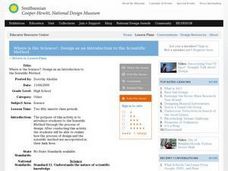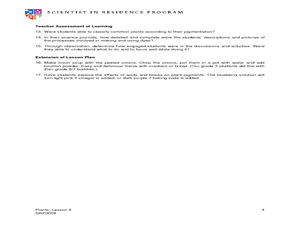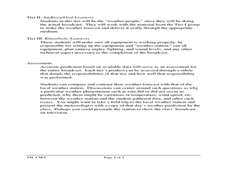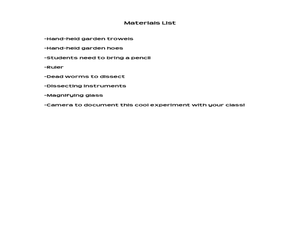Curated OER
Where is the Science?: Design as an Introduction to the Scientific Method
Young scholars work to create a design that will protect an egg from being dropped from a one story floor. They test their prototype after it is completed. They write clear instructions and link aspects of the design process to the...
Curated OER
Word Search
Here is a word search that has more educational value than most. After finding the 14 words that have to do with natural resources, learners must then use the words in context. They answer 14 questions on the second page of the...
Howard Hughes Medical Institute
Testing a Hypothesis
Are sickle cell disease and malaria related somehow? Scholars learn about both illnesses and the hypotheses that they are related. They discuss, view a video, and answer questions to demonstrate understanding. The resource includes an...
Purdue University
Tree Talk
Examining tree rings shows more than just age. The third installment of a five-part Family Nature Program unit has learners examine all parts of trees including tree rings to tell stories about the life of the tree. They then use their...
Cornell University
Glued into Science—Classifying Polymers
Explore the unique characteristics of polymers. A complete instructional activity begins with a presentation introducing polymers. Following the presentation, young scientists develop a laboratory plan for creating substances using...
Curated OER
Fracking: Positive or Negative Impact?
Your teenagers may have heard of fracking, but do they really know what it is? And could they debate the benefits and risks? Educate your environmental science class with a lesson about hydraulic fracturing, non-renewable energy...
Virginia Department of Education
Current Applications in Science
High schoolers may claim to have no interest in scientific revelations and discoveries, but watch how quickly they download a new app onto their state-of-the-art smartphones. Scholars discuss the scientific or technological...
Curated OER
Lesson Plan Outline for Rainbow Science
Young scientists study light reflection and refraction as they determine the critical angle, the rainbow angle, and color separation in rainbows. Teams record the data they collect in a shared spreadsheet and discuss results with the class.
Curated OER
Hazards: First Grade Lesson Plans and Activities
Examine the environmental hazards associated with volcanoes with a three-part science lesson. In the pre-lab, first graders learn that gas, landslides, ash, and lava are all hazards that come from volcanoes. They then explore...
NOAA
What Killed the Seeds?
Can a coral cure cancer? Take seventh and eighth grade science sleuths to the underwater drugstore for an investigation into emerging pharmaceutical research. The fifth installment in a series of six has classmates research the wealth of...
Curated OER
Natural Resources: Can We Use Them Forever? Grade 2
Bright colors and animation are great ways to attract a young students attention. Students are introduced to the concepts of renewable and non-renewable resources as they pose the question, will our resources be around forever? This...
Curated OER
Pre-Activity Worksheet: Natural Selection
Although the instructions include reading from a specific textbook, the tasks are appropriate for any unit dealing with how genotype frequency changes over time. Junior biologists define five vocabulary terms and then answer five...
Curated OER
Nature, Red in Tooth and Claw
Students explore the science and art of taxidermy, and research various biomes that could be depicted in museum displays. They synthesize their knowledge by creating dioramas that depict the diverse life forms typical of these biomes.
Curated OER
Summer Activities: The Wonders of Nature!
Young scholars examine the world of nature. For this early childhood lesson plan, students develop observation skills as they bird-watch and make rainbows, experimentation skills as they explore seeds and carrots, prediction skills as...
Curated OER
Science Charades
Students dramatize the wonderful world of nature, without making a sound. In this early childhood creative thinking lesson, students dramatize different aspects of nature to develop creative thinking, reading, memory, and motor skills.
Curated OER
Using Plant Pigments as Natural Dyes
Young scholars create friendship bracelets and quilt squares. In this plant lesson plan student dye their own string and cotton material with plant pigments. Students use the naturally dyed materials to create the friendship bracelets...
Curated OER
Poverty and Natural Disasters: Exploring the Connections
Students explore the connections between natural disasters and poverty. In this economic lesson students examine worksheets and activities for each level.
Curated OER
Do The Research! Forces of Nature
For this researching forces of nature worksheet, students read and record information about tornadoes, hurricanes, and the largest hailstones. Students write 3 short answers.
Curated OER
Nature of Science and Technology
Fourth graders measure weather using different instruments and gather information to make science comparisons. In this weather measurement lesson plan, 4th graders have activities they can complete whether they are visual, auditory,...
Curated OER
Hurricanes 1: The Science Of Hurricanes
Young scholars are introduced to the science of hurricanes in an effort to highlight how forces change the speed and direction of motion. They list facts about hurricanes; including insights about the formation, movement, and impact...
Curated OER
Top 10 Summer Science Lesson Plans
Make this summer an exciting learning experience for your students with these engaging science activities!
Curated OER
A Science Trail: Worms
Third graders explore worms in multiple ways. In this lesson on worms, 3rd graders search for worms in their natural environment, record data on worms, and dissect worms.
Curated OER
3rd grade life science
In this life science learning exercise, 3rd graders answer multiple choice questions about plants, birds, habitats, and more. Students complete 20 questions.
Other popular searches
- History and Nature of Science
- The Nature of Science
- Nature of Science Biology
- Nature of Science Inquiry
- Nature of Science Physics
- History Nature of Science
- Science Patterns in Nature
- Genetics Nature of Science
- Teaching Nature of Science
- Nature of Science Weather
- Genetic Nature of Science
- Science and Nature

























